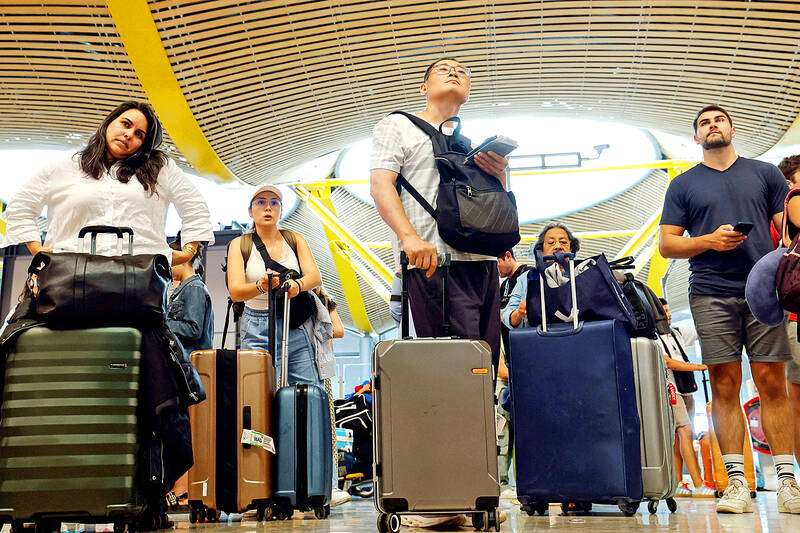Airlines, banks, TV channels and other business across the globe were scrambling yesterday to deal with one of the biggest IT crashes over the past few years, caused by an update to an antivirus software.
Aviation officials in the US briefly grounded all planes, while airlines elsewhere canceled or delayed flights, as systems running Microsoft Windows crashed.
Microsoft said the issue began at 7pm GMT on Thursday, affecting users of its Azure cloud platform running cybersecurity software CrowdStrike Falcon.

Photo: AFP
“We recommend customers that are able to, to restore from a backup from before this time,” the US software giant said in a technical update on its Web site.
CrowdStrike CEO George Kurtz in a post on several social media platforms said that a fix had been rolled out for the problem, describing it as a “defect found in a single content update for Windows hosts.”
Experts suggested applying the fix would not be straightforward.
The global nature of the failure prompted some commentators to question the reliance on a single provider for such a variety of services.
Shares in CrowdStrike slumped by 20 percent in premarket trading.
From Amsterdam to Zurich, Singapore to Hong Kong, airport operators flagged technical issues that were disrupting their services.
Some airports told planes they could not land, while in others airline staff began checking in passengers manually.
“I’m just in limbo as to how long I’ve got to wait here,” traveler Alexander Ropicano told reporters as he waited at Sydney Airport in Australia.
The 24-year-old, flying to Brisbane to see his girlfriend, said the airline told him to “wait until the system is operational again.”
The US Federal Aviation Administration in a notice to airlines early yesterday said that all flights “regardless of destination” were to be grounded.
However, American Airlines later said that as of 9am GMT “we have been able to safely re-establish our operation.”
“We apologize to our customers for the inconvenience,” the airline said.
Major airports including Berlin, which had suspended flights earlier yesterday, said departures and arrivals were gradually resuming.
Meanwhile, Taiwan Taoyuan International Airport said its airline systems got disrupted.
Airlines including AirAsia X, Tigerair Taiwan, Jetstar Airways, HK Express Airways, Jeju Air and Scoot were affected by the technical issue, the airport said.
Airline staff resorted to conducting passenger registration and seat allocation procedures manually, after Microsoft cloud-based booking-management system Navitaire was impacted by the outage, airport authorities said.
The Ministry of Digital Affairs issued a statement saying the ministry “inspected the status and operations of critical government information systems,” including the household registration and tax systems, as soon as the technical issue was discovered.
Critical government information systems were not affected and were operating normally, although some personal computers had malfunctioned, the ministry said.
Additional reporting by CNA

CHAOS: Iranians took to the streets playing celebratory music after reports of Khamenei’s death on Saturday, while mourners also gathered in Tehran yesterday Iranian Supreme Leader Ayatollah Ali Khamenei was killed in a major attack on Iran launched by Israel and the US, throwing the future of the Islamic republic into doubt and raising the risk of regional instability. Iranian state television and the state-run IRNA news agency announced the 86-year-old’s death early yesterday. US President Donald Trump said it gave Iranians their “greatest chance” to “take back” their country. The announcements came after a joint US and Israeli aerial bombardment that targeted Iranian military and governmental sites. Trump said the “heavy and pinpoint bombing” would continue through the week or as long

TRUST: The KMT said it respected the US’ timing and considerations, and hoped it would continue to honor its commitments to helping Taiwan bolster its defenses and deterrence US President Donald Trump is delaying a multibillion-dollar arms sale to Taiwan to ensure his visit to Beijing is successful, a New York Times report said. The weapons sales package has stalled in the US Department of State, the report said, citing US officials it did not identify. The White House has told agencies not to push forward ahead of Trump’s meeting with Chinese President Xi Jinping (習近平), it said. The two last month held a phone call to discuss trade and geopolitical flashpoints ahead of the summit. Xi raised the Taiwan issue and urged the US to handle arms sales to

State-run CPC Corp, Taiwan (CPC, 台灣中油) yesterday said that it had confirmed on Saturday night with its liquefied natural gas (LNG) and crude oil suppliers that shipments are proceeding as scheduled and that domestic supplies remain unaffected. The CPC yesterday announced the gasoline and diesel prices will rise by NT$0.2 and NT$0.4 per liter, respectively, starting Monday, citing Middle East tensions and blizzards in the eastern United States. CPC also iterated it has been reducing the proportion of crude oil imports from the Middle East and diversifying its supply sources in the past few years in response to geopolitical risks, expanding

Pro-democracy media tycoon Jimmy Lai’s (黎智英) fraud conviction and prison sentence were yesterday overturned by a Hong Kong court, in a surprise legal decision that comes soon after Lai was jailed for 20 years on a separate national security charge. Judges Jeremy Poon (潘兆初), Anthea Pang (彭寶琴) and Derek Pang (彭偉昌) said in the judgement that they allowed the appeal from Lai, and another defendant in the case, to proceed, as a lower court judge had “erred.” “The Court of Appeal gave them leave to appeal against their conviction, allowed their appeals, quashed the convictions and set aside the sentences,” the judges